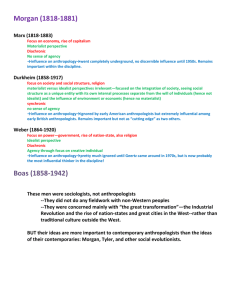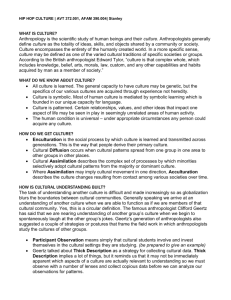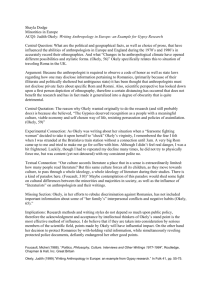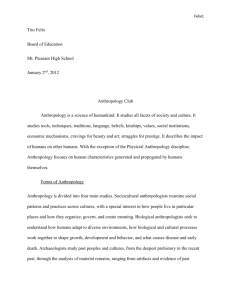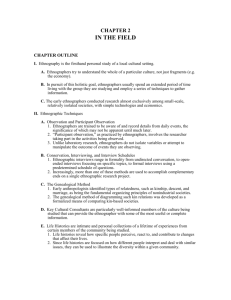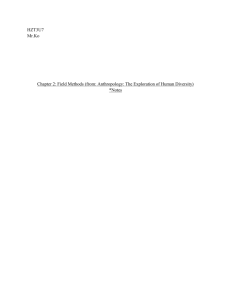Overhead2
advertisement
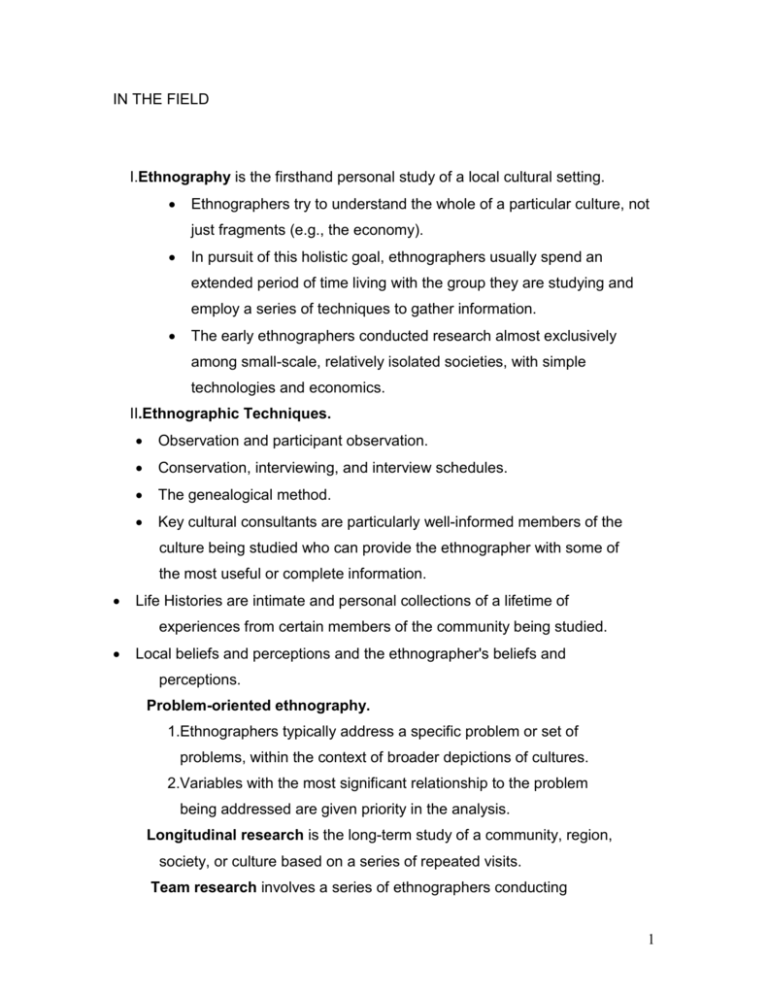
IN THE FIELD I.Ethnography is the firsthand personal study of a local cultural setting. Ethnographers try to understand the whole of a particular culture, not just fragments (e.g., the economy). In pursuit of this holistic goal, ethnographers usually spend an extended period of time living with the group they are studying and employ a series of techniques to gather information. The early ethnographers conducted research almost exclusively among small-scale, relatively isolated societies, with simple technologies and economics. II.Ethnographic Techniques. Observation and participant observation. Conservation, interviewing, and interview schedules. The genealogical method. Key cultural consultants are particularly well-informed members of the culture being studied who can provide the ethnographer with some of the most useful or complete information. Life Histories are intimate and personal collections of a lifetime of experiences from certain members of the community being studied. Local beliefs and perceptions and the ethnographer's beliefs and perceptions. Problem-oriented ethnography. 1.Ethnographers typically address a specific problem or set of problems, within the context of broader depictions of cultures. 2.Variables with the most significant relationship to the problem being addressed are given priority in the analysis. Longitudinal research is the long-term study of a community, region, society, or culture based on a series of repeated visits. Team research involves a series of ethnographers conducting 1 complimentary research in a given community, culture, or region. Grant Proposal. Anthropologists need funding to support their research in the field. 1.There are a series of agencies that support anthropological research. 2.In order to receive funding from any of these institutions, anthropologists must write grant proposals that summarize what questions are going to be addressed, where the research will be conducted, and how it will be done. Why this topic/problem? 1.The grant writer must present the topic or problem that will be addressed during the proposed research. 2.The writer needs to convince the agency that the topic is important and worthy of being funded. Why this place? 1.The grant writer needs to demonstrate the connection between the research topic and the location where the research will be carried out. 2.Some locations address certain topics better than others. Why this person? 1.The grant writer needs to identify the special qualifications that he or she brings to the research topic. 2.Proficiency in the local language, previous research experience in the area, and strong local contacts are important. How will the study be done? 1.The grant writer needs to discuss, as specifically as possible, how this research will be carried out. 2.This section can include a discussion of the techniques and methods as well as the logistics of living in the study community and gaining permission from the study community to perform the research. 2 Ethics (American Anthropological Association (AAA) Code of Ethics, 1997) Research ethics. 1.Responsibility to people and animals. 2.Responsibility to scholarship and science. 3.Responsibility to the public. Teaching ethics. 1.Anthropologists should conduct their programs in ways that preclude discrimination on the basis of sex, marital status, "race", social class, political convictions, disability, religion, ethnic background, national origin, sexual orientation, and age. 2.Anthropologists should strive to improve their teaching and training techniques. 3.Teachers should impress a concern with ethics on their students. 4.Teachers should properly acknowledge student assistance in their research and in the preparation of their work. 5.Teachers must avoid sexual liaisons with those for whose education and professional training they are in any way responsible. Ethics for applied anthropology. 1.Applied anthropologists should use and disseminate their work appropriately. 2.With employers, applied anthropologists should be honest about their qualifications, capabilities, aims, and intentions. 3.Applied anthropologists should be alert to the danger of compromising ethics as a condition for engaging in research or practice. 3 Survey Research. Anthropologists working in large-scale societies are increasingly using survey methodologies to complement more traditional ethnographic techniques. Survey research is considerably more impersonal than ethnography. Anthropological Research in Complex Societies. Responses to world complexity. 1.Broader research methods, such as surveys, have been used to avoid the problems associated with generalizing about a whole society based upon the study of a single community. 2.Multiple community studies are done as part of a single, multiplex ethnography. 3.Researchers must integrate ethnography with survey research. Urban anthropology. 1.Particularly since the 1950s, anthropologists have begun to apply ethnographic techniques to populations living in cities. 2.The fact that many anthropology departments exist in or close to cities has influenced the way urban anthropology is practiced. Anthropology in complex societies. 1.Anthropologists rely increasingly on a variety of different field methodologies to accommodate a demand for greater breadth of applicability of results. 2.Many anthropologists argue that the core contribution of ethnology remains the qualitative data that result from close, long-term, in-depth contact between ethnographer and subjects. 4

